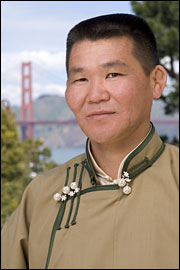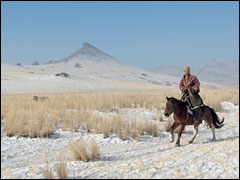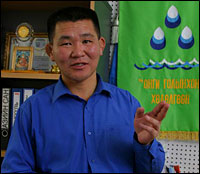
Ts. Munkhbayar.
Photo: Goldman Environmental Prize.
Born into a family of Mongolian herders, Ts. Munkhbayar remembers when the livestock was healthy, the water was clean, and kids went ice skating on the nearby river. “I had a very happy childhood,” he says. In the early 1990s, a gold-mining boom overshadowed all that; because of widespread hydraulic mining, which uses high-pressure water systems, the river shrank, his family was sickened by polluted well water, and community members fled.
“I just couldn’t stand there and see the whole village be destroyed by the mining companies,” Munkhbayar remembers. He began to organize his neighbors, and before long, he sold his animals and moved his campaign to the city. The Onggi River Movement, the group he founded, eventually helped shut down 35 of the 37 mining operations in the basin, and convinced the government to strengthen and enforce its mining regulations.
Munkhbayar, 40, was awarded one of six 2007 Goldman Environmental Prizes at a ceremony in San Francisco on April 23. He spoke to Grist through a translator.
Could you describe the effects of unregulated mining on the Onggi River?
The Onggi River is one of the biggest 15 rivers in Mongolia, and it runs into Red Lake, which is one of the biggest lakes in Mongolia. Starting in 1993, the mining companies started digging for gold around the Onggi River basin, and they destroyed 31 of the 200 small rivers and creeks that run into the Onggi. In order to mine the gold, they divert the rivers, destroying their natural course. [Without these tributaries], the Onggi River, which used to run 427 kilometers [265 miles], ran only 96 kilometers [60 miles], and Red Lake dried out completely.
I understand you come from a family of herders. Has mining affected your family and its livelihood?
Because we didn’t have water to drink, we had to dig a hole and make a well, but that well water was so contaminated that 30 or 40 kids got very serious liver damage. My youngest son, who is 15 years old, got sick from drinking that water, and my mother, who was only 50 years old, passed away because of liver damage.
Eventually the herders had to move out, seeking a place with water, and the villages around the river were completely deserted.
How is your son’s health now?
In Mongolia, the health system is not that good, but we are trying our best to support him. He is running and playing like the regular kids, but he cannot move heavy things, and his physical activities are limited in other ways.
So what strategies did you use to fight destructive mining along the river?
I started as a solo person, but very shortly I realized I couldn’t do this all by myself. I started recruiting a lot of local people with my idea of protecting the river, and they eventually elected me to lead their movement.

Tending a way of life.
Photo: Will Parrinello
First I tried to influence the decision-makers, who grant the exploration and mining licenses to mining companies. The second was to try to make the mining practices open to the public. We brought the press and media in, so they could broadcast what the mining companies were doing to the land. Thirdly, I tried to involve the local people as much as possible in organized marches along the river — we began a civil grassroots movement to stop the mining activities.
What opposition did you encounter? Were you ever threatened?
Money is very powerful, so I received a lot of threats. People would call me at night and during the day and just demand that I stop — otherwise, they said, they would do harm to me and my family. Also physically we fought against the mining companies.
You physically fought each other?
Yes, the security guards at these mining sites fought with the people who would demonstrate at the sites. The guards shot in the air, and [in the confrontations] we got bruises and cuts along our arms. A pregnant woman lost her baby.
The mining companies have also used the media to discourage our activities, saying untrue things about us to give us a bad reputation.
So what keeps you going?
People’s trust in me. I think that all the people who live around this river trust me, and expect me to lead them. They expect me to do something to stop these damages, so I cannot just give up right now. Initially my friends discouraged me — they didn’t believe my arguments. I expected that bad things would happen to me, that maybe I would just give my life away, but I continued to stand on my own.
What do you consider your greatest accomplishments?
By stopping the mining activities along the river, we showed the people that we could achieve something. Our river started running again, and now it runs about 200 kilometers [124 miles].
Traditionally, Mongolian Parliament members are very distant from the local people. But we pressed our representatives in the Parliament and got their word that they would help restore the river and stop these destructive mining practices. Because of these six people who represent us, there was a one-day session in the Parliament dedicated to our problems. Because of that action, the attorney general of Mongolia opened a case against one of the two companies left in the Onggi River area. The law has been changed, and now the government licensing agency will ask for our approval before granting mining licenses.
What remains to be done?

Holding forth at the Onggi River Movement HQ.
Photo: Will Parrinello
The problem started with the Onggi River, but now it covers the whole of the Mongolian land. We have to strengthen our coalition — we recently established a coalition of 11 environmental movements [the Mongolian Nature Protection Coalition] to fight against destructive mining and pollution. So we have a lot of things to do, not only around the Onggi River but also throughout the country.
How do you support yourself as a full-time activist?
Basically, I don’t have any personal funding — I had to sell my livestock to move into the city to fight. We ask donors, especially international organizations, to help our movement, and a very small percentage of that money supports me.
What does this prize mean to you?
It gives me more inspiration and encouragement that I’m doing the right thing and that the people support me. It also gives me some kind of life guarantee for my family and my children. But of course with the money, I have more responsibility.
How do you plan to use the money?
A portion of the money will also go to strengthen the movement and the coalition, and another portion to my project of educating students on the environment. I’m also thinking about establishing an environmental prize — like a Goldman Prize — in Mongolia, to recognize the people who have dedicated their lives to environmental protection.


